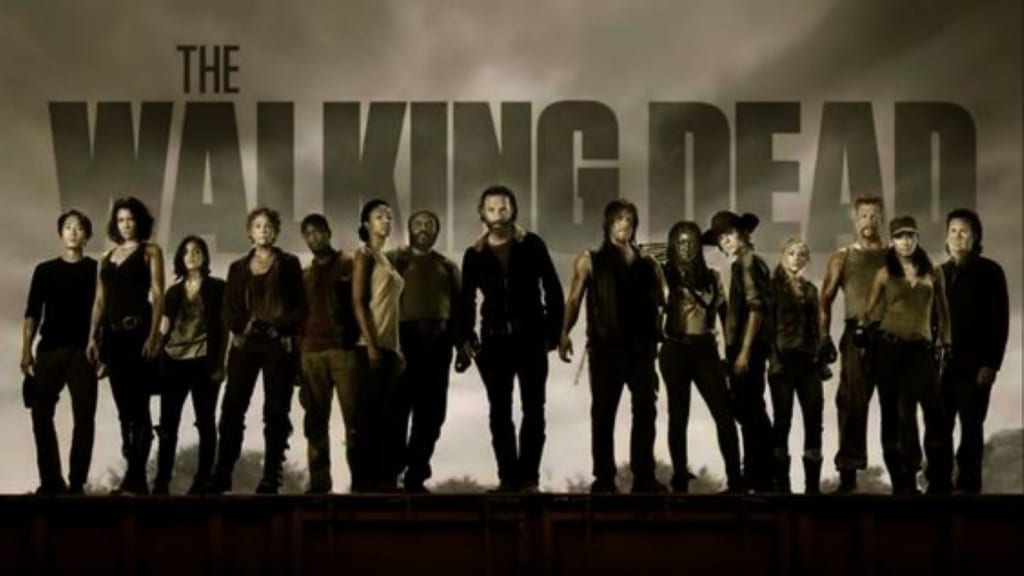Cultural Phenomena Unleashed
How "The Walking Dead" Redefined a Generation

"The Walking Dead" is one my favorite TV shows, although, I was a late to the party because I only started watching while in lockdown on Netflix in 2020. Yes, I was 9 seasons late for the party but I still had fun. In the annals of television history, few shows have captivated audiences and left an indelible mark on popular culture like "The Walking Dead." This post-apocalyptic zombie drama has transcended mere entertainment to become a cultural phenomenon, shaping an entire generation's perceptions, sparking debates, and redefining the television landscape. So, let's delve into the gripping world of walkers, survivors, and moral quandaries as we explore how "The Walking Dead" unleashed a cultural revolution that continues to reverberate today.
Rising from the Grave: Reviving the Zombie Craze
Before "The Walking Dead" emerged on the scene, zombies had been relegated to the sidelines of pop culture, lurking in the shadows of their former glory. However, this gripping series single-handedly resurrected the undead genre, unleashing a relentless wave of zombie popularity across various media. From movies to video games, literature to cosplay, the show's influence on the cultural zeitgeist is unmistakable.
From Page to Screen: Pioneering Comic Adaptations
"The Walking Dead" shattered preconceived notions about comic book adaptations, blazing a trail that numerous others have since followed. By faithfully bringing Robert Kirkman's celebrated graphic novel series to life, the show proved that comics could transcend their traditional niche and find success on the small screen. This groundbreaking achievement opened the floodgates for a new era of comic adaptations, forging an indissoluble link between sequential art and mainstream television.
Bite-Sized Obsession: The Dawn of Serialized Storytelling
"The Walking Dead" revolutionized the way we consume television, pioneering the era of binge-watching and leaving viewers perpetually on the edge of their seats. Its compelling serialized storytelling format transformed casual viewers into die-hard fans, eagerly awaiting each episode and engaging in heated discussions online. With its labyrinthine plotlines and tantalizing cliffhangers, the show cultivated an insatiable appetite for long-form narratives that continues to redefine the television landscape.
Humanity at the Brink: Character-Driven Drama
Beyond its undead hordes, "The Walking Dead" wove a rich tapestry of characters struggling to retain their humanity in a merciless world. This character-driven approach resonated deeply with audiences, evoking empathy, forging emotional connections, and sparking passionate debates. From the relentless survival instincts of Rick Grimes to the resilience of Carol Peletier, the complex portrayal of these characters struck a chord, illuminating the depths of human nature in the face of adversity.
Ethical Quandaries: Delving into the Shadows of Morality
"The Walking Dead" forced viewers to confront moral dilemmas that transcended the boundaries of fiction. Its post-apocalyptic landscape served as a crucible for exploring the lengths one would go to protect loved ones, the blurred lines between right and wrong, and the fragility of ethical codes in desperate times. These ethical quandaries became viral discussions, igniting impassioned debates on social media and challenging viewers to ponder their own values and actions in analogous scenarios.
The Living Dead Community: A Legacy of Fandom
Beyond the screen, "The Walking Dead" spawned a vibrant and dedicated fan community that thrived on the shared experience of surviving this harrowing universe. From convention meet-ups to online forums, fans gathered to discuss theories, dissect plotlines, and express their creativity through fan art and cosplay. This tight-knit community became a testament to the enduring impact of the show, forging lasting connections and establishing a lasting legacy.
In conclusion, "The Walking Dead" stands as a cultural touchstone that reshaped television, breathed life into the zombie genre, and defined a generation. By intertwining complex characters, moral quandaries, and pulse-pounding storytelling, the show captured the hearts and minds of millions, leaving an indelible mark on popular culture.
From its humble beginnings, "The Walking Dead" emerged as a groundbreaking force, reinvigorating the zombie genre and unleashing a wave of undead fascination that swept across various forms of media. It proved that zombies were more than mindless creatures; they became powerful metaphors for humanity's resilience and the precarious nature of our existence.
Beyond the zombies, the show's success can be attributed to its ability to connect with viewers on a deeply emotional level. The characters became more than mere actors on a screen; they became vessels through which audiences could explore the depths of their own humanity. Their struggles, sacrifices, and moral dilemmas forced us to question our own beliefs and contemplate what it truly means to be human.
In its wake, "The Walking Dead" paved the way for other comic book adaptations, demonstrating that the richness of sequential art could be successfully translated to the screen. It shattered the notion that superheroes were the sole domain of comic book pages, encouraging a renaissance of adaptations that expanded the boundaries of storytelling.
The show's impact extended beyond the screen, forging a community of passionate fans who connected over their shared love for this apocalyptic world. From engaging in spirited debates to celebrating their favorite characters through fan art and cosplay, "The Walking Dead" fostered a sense of camaraderie and belonging that transcended the boundaries of traditional fandom.
"The Walking Dead" will forever be remembered as a cultural phenomenon that challenged the status quo and reshaped the television landscape. Its influence can be seen in the rise of serialized storytelling, the exploration of complex moral dilemmas, and the power of dedicated fan communities. It showed us that even in the face of despair, hope can endure, and humanity can persist.
As we bid farewell to the survivors and their struggle for survival, the legacy of "The Walking Dead" lives on. It continues to shape the way we consume and appreciate television, while its impact on the collective consciousness of a generation remains an enduring testament to its cultural significance. So, grab your survival gear and join the ranks of those forever marked by this unforgettable journey through the post-apocalyptic world—a journey that has shaped a generation and left an undeniable imprint on our cultural landscape.
About the Creator
L A McFarlane
I love writing about pop culture, delving into thought-provoking themes and subjects that motivate and challenge readers' perspectives and encourage them to reflect on their own beliefs.
I’m also currently writing my first fictional novel.






Comments
There are no comments for this story
Be the first to respond and start the conversation.